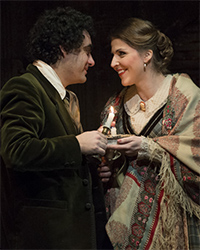In a recent review — written by an English critic — of a production of La boheme, the soprano in the leading role was described as “well suited to the role of Mimi in her homely, demure appearance.” Is the use of the word homely here a compliment or an insult — or neither? Well, it depends on who’s reading it… To British-English readers, and especially to those familiar with the character in question, the meaning is fairly clear: she was presumably simply dressed and not striking in looks, as befits the character of Puccini’s ailing and unassuming seamstress. But North American readers might have been surprised by the reviewer’s assertion that a “homely” appearance was well-suited to the doomed heroine, since we don’t generally think of Mimi as being ugly.
The OED explains the word’s different meanings on either side of the Atlantic: 1. Brit. a. simple, plain. b. unpretentious. c primitive. 2. N. Amer. (of people or their features) not attractive in appearance, ugly. 3. comfortable in the manner of a home, cosy. 4. skilled at housekeeping.
Curiously, the word plain — one of homely‘s synonyms — is understood by both Brits and Yanks when describing the fairer sex (and the adjective is rarely if ever used to qualify the looks of a man or boy) as not just ordinary or undistinguished in countenance, but as positively unattractive. “She’s no oil painting” could be said of all the plain women of the New World and the old.
When William Wordsworth wrote his poem To the Daisy, the English poet was surely finding a certain beauty in “that homely face” that populates the lawns of English gardens, rather than dismissing the white-petaled weed as unbecoming.
With little here to do or see
Of things that in the great world be,
Sweet Daisy! oft I talk to thee,
For thou art worthy,
Thou unassuming Common-place
Of Nature, with that homely face,
And yet with something of a grace
Which love makes for thee…
When Benjamin Franklin mused “Let thy maidservant be faithful, strong, and homely“, he was presumably playing on the word’s different meanings — namely, skilled in housekeeping, and safely unattractive.

